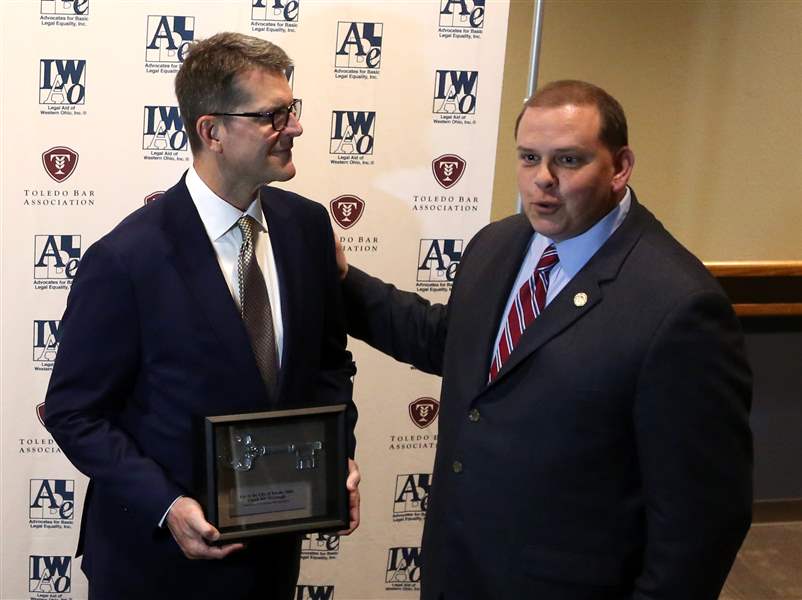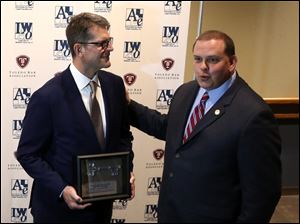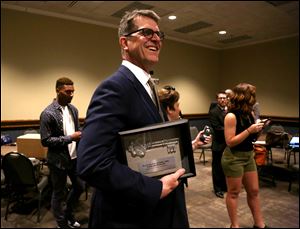
Harbaugh visits Toledo to advocate for equality in court system
5/10/2018
Michigan head coach Jim Harbaugh, left, is presented the key to the city by Mayor Wade Kapszukiewicz ahead of the ABLE Access to Justice awards dinner at the SeaGate Centre.
The Blade/Kurt Steiss
Buy This Image
Scouting opponents and coaching quarterbacks consumes a majority of Jim Harbaugh’s time. In the the ultra-competitive coaching world, recruiting and preparation is a 365-day enterprise, so championing a cause doesn’t come easy.
But Harbaugh has carved out days to advocate for low-income Americans in need of legal assistance. The Michigan coach is a member of the Legal Services Corporation’s Leaders Council, traveling to Washington, D.C. last summer to speak at a congressional hearing at the Russell Senate Office Building.

Michigan head coach Jim Harbaugh, left, is presented the key to the city by Mayor Wade Kapszukiewicz ahead of the ABLE Access to Justice awards dinner at the SeaGate Centre.
On Thursday, he was in Toledo serving as the keynote speaker for Advocates for Basic Equality and Legal Aid of Western Ohio’s Access to Justice Awards Dinner at the SeaGate Convention Centre, where he was presented with a key to the city by Mayor Wade Kapszukiewicz.
More than 800 tickets were sold, and $100,000 was raised for ABLE, LAWO, and the Toledo Bar Association, $40,000 more than last year’s event.
“The legal system is one of the pillars of freedom we have in our country,” Harbaugh told The Blade. “It should be like the postal system. Everyone should have access. There's a post office in every town, no matter where it is, how big or how small. There should be a way for people to understand how to fill out paperwork, have their case heard, and be represented through our legal system. That's really all anyone has to turn to during a dispute to get a fair resolution.”
The LSC unveiled a report titled “The Justice Gap: Measuring the Unmet Civil Legal Needs of Low-Income Americans” during Harbaugh’s trip to Washington. The report found that 86 percent of civil legal problems reported by low-income Americans from 2016-17 were not addressed with adequate or professional legal help, shining a light on a system that many feel is rigged against the poor.
Harbaugh’s involvement is extremely important, according to Patty Wise, president of the board of trustees for ABLE and LAWO, because his voice has such a broad reach. It causes people who would otherwise not pay attention to the topic to pause and focus on the issue for a moment.
“He brings such passion to the issue, and people understand his passion,” said Wise, a partner with Spengler Nathanson P.L.L. and a lecturer in law at the University of Toledo College of Law. “Everyone knows the passion he has around football, so when they see his passion applied to something else, he has instant credibility. He can explain things in a way that people understand.
“He says, ‘Imagine putting a football team on a field and giving only 20 percent of the team football helmets,’ and then saying, ‘Good luck guys, let’s see how this goes for you.’ I’ve never heard a better illustration for the problem.”
R. Michael Frank, the founding executive director of ABLE; Dr. Celia Williamson, the founder and president of the National Research Consortium on Commercial Sexual Exploitation; and Gretchen DeBacker, the city of Toledo’s legislative director, were all honored for their service at the dinner.
The 2017 report conducted by the National Opinion Research Center at the University of Chicago found that low-income Americans often don’t seek legal help because they’re concerned about cost and where to find help.

Jim Harbaugh holds the key to the city presented to him by the mayor ahead of the ABLE Access to Justice awards dinner.
Seven of every 10 low-income households has experienced at least one civil legal problem in the past year and 70 percent who reported a legal problem said it affected them “very much” or “severely.”
President Trump has proposed eliminating funding for LSC, which has an annual budget of $385 million, with an additional $15 million to fund legal services for victims of natural disasters.
“Legal Services Corporation, when it comes to civil suits, that’s the only place they can turn,” Harbaugh said. “Even with that in place in our legal system, millions of people still go unrepresented. There's a long list where your chances of winning a fair judgment, or in someone’s favor, is much less without representation.”
The interest in law and the justice system stems from Harbaugh’s 30-year friendship with John Levi, a prominent Chicago attorney who played a crucial role in Barack Obama’s rise through the city’s political system. Levi, the chairman of the LSC Board of Directors, tapped Harbaugh to get involved in the organization.
Harbaugh is also a devoted viewer of Judge Judy — “Who isn’t,” he said — Perry Mason, and The Rockford Files. During the summer of 2017, he observed Judge F. Kay Behm’s courtroom at Genesee Probate Court in Flint and even performed some clerk duties.
“I'm really interested in seeing how it works,” Harbaugh said.
The up-close experience in recent years was described as “sobering” by Harbaugh, who believes a lack of equal access to justice makes it difficult to have a functioning society as the founding of the United States was envisioned.
“Those principles of fairness are core to our democracy,” Harbaugh said. “Some of the courts with fines and fees, that's another disturbing thing. A fee to go to court and fines — if you don’t have the money to pay the fine, it doubles and triples and prevents someone from having a job.
“Where does that leave the legal system to where it can be fair and not predicated on, do you have or money or not? If you do, you can afford an attorney. If you don’t, you can’t. The access to justice should not be predicated on having means. There’s a flaw in the system.”
It’s a defect that Wise hopes is noticed by people who haven’t been aware of the justice gap, spurring them to understand it and care about it.
“It’s beyond cool [that Harbaugh speaks out],” she said. “He’s an inspiration to all of us. I think anyone that reveres him for the passion and success he’s had in football will see that he's so much more than a one-dimensional person.”
Contact Kyle Rowland at krowland@theblade.com, 419-724-6110 or on Twitter @KyleRowland.